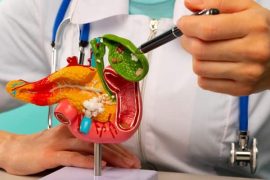Зміст
Is it normal to wake up at night with stomach pain? NO. Fortunately, although it is unpleasant, the reason does not have to be serious.
Abdominal pain at night can accompany many health problems. This is a fairly common symptom. If you want to effectively fight it, you need to correctly interpret the symptoms, make the correct diagnosis and… take appropriate measures.
Stomach pain: irritable bowel syndrome
Gases also accumulate in the intestines of people suffering from irritable bowel syndrome. Each person with this condition suffers slightly differently – but in general, the main symptoms are: bloating, gas, various types of abdominal pain (including at night), diarrhea (more often) or constipation (less often). Irritable bowel syndrome typically causes pain localized in the lower abdomen and associated with sudden intestinal spasms. It happens that contractions are accompanied by diarrhea. Yes, unfortunately, also at night…
Stomach pain: Stomach ulcer
Stomach ulcers cause pain that patients describe as hot, burning and unpleasant. They may be accompanied by a feeling of sudden suction of the hole, a sucking sensation reminiscent of hunger, but very intense, bordering on nausea. Abdominal pain at night caused by ulcers is more intense when the stomach is full and its walls are distended, or when it is completely empty – but full of acid. At night, the stomach is usually empty, so acids can attack the lining of the stomach and cause pain.
Stomach pain: Heartburn
If it occurs occasionally, it is typically the result of overeating, drinking too much liquid, lying down immediately after eating, or eating foods that cause heartburn (such as spicy, tomato-based, sweet, or very hard to digest foods). If you suffer from heartburn more than once a week, it is already a chronic problem and can lead to more serious problems (for example, damage to the lining of the esophagus and even cancer in the future). Heartburn is often accompanied by abdominal pain, or rather a burning sensation in the stomach and behind the sternum. Heartburn, although it can cause stomach pain at night, rarely wakes you up. However, this typically prevents you from falling asleep.
Stomach pain: Gallstones
These solids that collect in the gallbladder and are partly made up of cholesterol can be very harmful. They cause very severe abdominal pain at night. The source of pain is usually the fact that the walls of the gallbladder are contracting to push the bile further, but inside they are colliding with stones. Sometimes a stone gets stuck in the bile duct and this causes pain. Moreover, if it cannot be pushed further, it blocks the bile duct, which can be extremely painful. Stomach pain at night due to gallstones can wake you up after a large dinner, especially if it was fatty.
Stomach ache: Stomach problems
Gas, nausea, vomiting and diarrhea are symptoms of a virus affecting the digestive system or food poisoning. They are typically accompanied by abdominal pain – both due to very painful and unpleasant stomach cramps and intestinal spasms. In both cases, you may also have a fever. Symptoms typically appear within a few hours of eating a certain food or coming into contact with the person who gave us the virus. Both of these conditions often cause abdominal pain at night – after all, it is then that several hours have passed after the ill-fated lunch or dinner.
Stomach pain: Kidney stones
The pain caused by kidney stones is localized in the back, but is so severe that it usually radiates to the abdomen. The pain is caused by the stone moving inside the kidney, irritating and possibly even injuring its delicate tissues. The pain is always sudden, always severe and almost always sharp. It is characteristic that although it can spread to the entire abdomen and even cause nausea, it is not accompanied by gases. The pain and its location may vary depending on the “route” of the stone, but there is undoubtedly pain that can interrupt the deepest sleep.
Abdominal pain, burning, belching and flatulence – how to treat?
Stomach pain: How to help yourself?
It all depends on the reason.
- For example, heartburn can be quickly treated with an over-the-counter stomach acid neutralizer. If you often suffer from heartburn, your doctor will prescribe special medications that reduce the amount of acid visible through your stomach. Lifestyle changes, such as eating smaller portions of foods that are less irritating to the stomach, also help.
- If you have an ulcer, you will need longer treatment: several weeks of antibiotics combined with drugs that suppress visible stomach acid. Taking medications that neutralize stomach acid or drinking flaxseed infusion (it coats the stomach walls with a protective layer) may temporarily help.
- Painful and persistent bloating will go away as soon as you release the gas. If you have problems with this, see here: Bloating – how to relieve gas. Here you will find text about positions that promote the release of gases that stubbornly adhere estines.
- If you think you may have irritable bowel syndrome (IBS) and if you share a duvet with someone, you may want to wear special underwear at night). It absorbs the smell, making it easier to sleep together without any shame.
- If you have food poisoning or the stomach flu, fasting, stomach-soothing herbs (mint, chamomile, and in the case of a virus, decarbonated cola), drinking hot water, getting plenty of rest, and taking anti-diarrheal medications if needed will help.
Stomach pain: When to seek medical help?
If the pain recurs or home remedies do not help, and the pain does not subside within several days (maximum five), you should ALWAYS consult a doctor. Making an accurate diagnosis on your own is something like playing roulette (hit or miss). You will likely need some testing and targeted, effective treatment. The sooner you start taking them, the sooner stomach pain at night will stop preventing you from resting.








